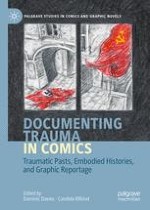2020 | OriginalPaper | Buchkapitel
4. The Past That Will Not Die: Trauma, Race, and Zombie Empire in Horror Comics of the 1950s
verfasst von : Michael Goodrum
Erschienen in: Documenting Trauma in Comics
Verlag: Springer International Publishing
Aktivieren Sie unsere intelligente Suche, um passende Fachinhalte oder Patente zu finden.
Wählen Sie Textabschnitte aus um mit Künstlicher Intelligenz passenden Patente zu finden. powered by
Markieren Sie Textabschnitte, um KI-gestützt weitere passende Inhalte zu finden. powered by
